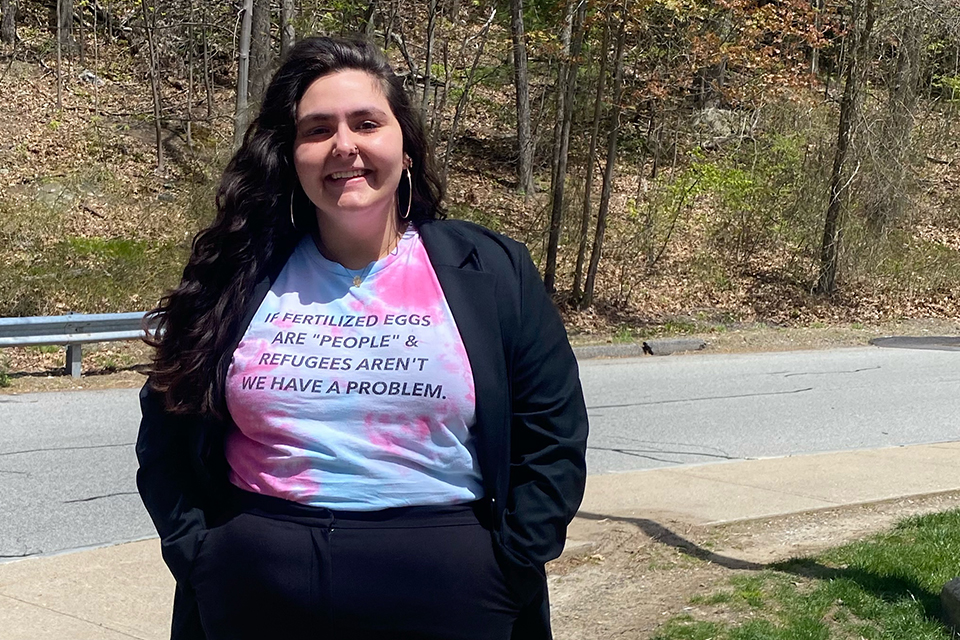Feeling Seen: One Brandeis Student’s Search for Community in Women’s, Gender, and Sexuality Studies

May 25, 2022
Sydney Adams | Graduate School of Arts and Sciences
Note: jessie neal’s name has not been capitalized at their request. jessie uses they/she pronouns.
As a “queer woman-adjacent person,” jessie neal chose to pursue Women’s, Gender and Sexuality (WGS) studies during their time at the University of Arizona because it made them “feel seen.” neal said, “i found stories that were alike to my own and a community that supported me in my pursuits. i find in general that WGS facilitates difficult conversations and personal growth that i really appreciate in an educational setting. WGS combines some of my greatest passions like history and theory into practice.”
neal hoped to continue their passion for WGS studies in a master’s program. Brandeis’ Women's, Gender and Sexuality Studies (WGSS) master’s program attracted them because it was “inviting and academically challenging.” neal says they chose “Brandeis over other schools because the faculty is very involved and invested in the success of the students.” Not only was the academic program important to neal, but they were also interested in Brandeis’ “location and community setting.” The final deciding factor that convinced neal to choose Brandeis was the support they received “financially and professionally.” Brandeis’ DEIS Scholarship gave neal the opportunity to, as neal says, “pursue my life passions in ways that i could have never imagined.” neal has found the support from the other DEIS scholars and the former Assistant Dean of Student Affairs, Kate Slater, has given neal a unique experience at Brandeis.The monthly meetings, neal says, “are facilitated with a gentle kindness that makes the environment feel like a little family.” neal says, “DEIS brought me to Brandeis, allowed me to meet my mentors, and heavily contributes to how i’m going to be able to travel to Guåhan [Guam].”
neal says the most interesting thing about the program is, “the range of topics that graduate students in the same program are pursuing.” neal says despite the diversity of interests, “WGS allows for communal theoretical grounding.” Their personal research interests is “focused on my family’s story,” says neal, “as well as my own and i find that oral histories are a great medium to do that work… creative non-traditional avenues both challenge what we have come to think of as standard in academic institutions and push boundaries of what is considered serious scholarship.” In their research neal says, “i hope to balance both traditional academic research in archives and oral histories as well as creative methods like photo albums and storytelling.”
neal credits the ability to pursue their research interests to the “exceptional” faculty at Brandeis. Specifically, ChaeRan Freeze, who, neal says, “has been so personally invested in helping me access funds to travel to Guåhan for my research, and working with me towards my goals. She has pushed me to view my research with joy and helped me come to terms with how little Pacific Islander scholarship there is out there…Dr. Freeze has walked me step by step through critical thinking and reading.” V Varun Chaudhry has also “shaped the entire theoretical base of how i frame my knowledge,” says neal. Though both Dr. Freeze and Dr. Chaudhry work outside neal’s area of research, “they have put in time and energy to understand me and the field,” says neal.
After receiving their MA, neal says, “i am looking forward to applying to PhD programs and continuing to tell CHamoru stories and history. i want to be involved in community activism and further my academic path.”
As for advice neal has for any students who wish to join the WGS MA program, they say, “Believe in yourself and your passions. Do it—take the leap. i encourage anyone and everyone to take a WGSS class or pursue a WGSS degree because, in this field, i have found my calling and community.”






